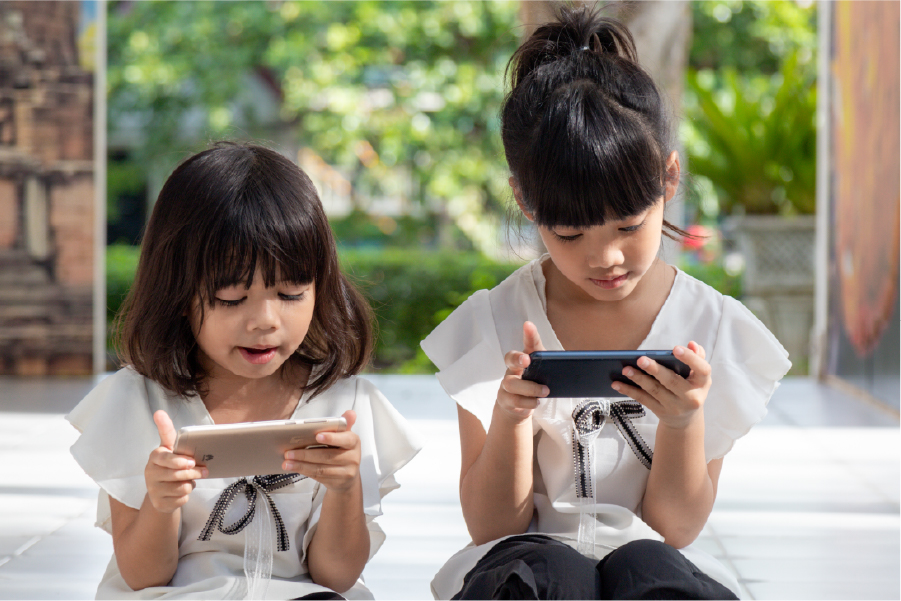Too much screen time can make it harder for children
to focus and complete tasks, but parents play a crucial role
in shaping healthier digital habits from an early age.
Issue 8 | March 2025

 Subscribe and ensure you don't miss the next issue!
Subscribe and ensure you don't miss the next issue!
As digital devices become inseparable from daily life, the question of how much screen time is too much for children has recently been thrown in the spotlight. In view of growing evidence on its potential effects, Singapore has introduced new guidelines to manage the use of screens among young children. This is part of a newly launched national health strategy, Grow Well SG, aimed at supporting families to build healthier habits in children.
In particular, the guidelines advise against screen exposure for infant under 18 months, except for interactive video chatting. For children aged 18 months to six years, recreational screen time should be kept under an hour a day, while those aged seven to 12 should limit it to less than two hours outside of school.
Assistant Professor Evelyn Law Chung Ning, Senior Consultant, and Adjunct Associate Professor Chong Shang Chee, Head & Senior Consultant, both from the Division of Developmental and Behavioural Paediatrics, Department of Paediatrics, Khoo Teck Puat – National University Children’s Medical Institute (KTP-NUCMI)1, National University Hospital (NUH), weigh in on the effects of screen time on cognitive development and what parents can do to cultivate healthier screen habits at home.
The effects of screen time
| 1. Can frequent use of digital devices make my child more easily distracted? Will they develop attention deficit hyperactivity disorder (ADHD)? |
There is local research showing that excessive screen time can affect a child’s executive function, which refers to essential mental skills such as attention control, working memory and the ability to complete tasks. Children who spend long hours on screens may struggle to focus, become easily distracted and find it difficult to complete activities such as homework.
However, this does not mean they have ADHD. The symptoms of excessive screen use can resemble ADHD-like behaviours, but the two are distinct. ADHD is a neurodevelopmental condition that typically requires medical intervention, whereas attention difficulties linked to screen exposure can often be improved by gradually reducing screen time and reinforcing healthier habits. |
| 2. I want to play educational videos for my one-year-old child. Why do the guidelines advise against screen use for children under 18 months, except for video chatting? |
During the first few years of life, a child’s brain undergoes rapid development, driven largely by real-world interactions. Unlike older children, infants and toddlers cannot fully process the fast-moving images and sounds on a screen. They can find it overwhelming to absorb information from two-dimensional screens.
Instead, face-to-face interactions with caregivers, such as talking, playing and responding to facial expressions, are far more effective in stimulating cognitive and language development. That’s why the guidelines recommend avoiding passive screen use for infants under 18 months, with an exception for video chatting, which allows for real-time social engagement. |
| 3. The guidelines limit recreational screen time but allow educational screen use for schoolwork. What’s the difference? |
The distinction lies in how content is consumed and its impact on the brain. Educational screen time, such as online learning platforms or school assignments, is typically structured, paced for comprehension and designed to support learning objectives.
In contrast, recreational screen use, including social media, video streaming and gaming, often involves fast-paced, highly stimulating content that can encourage excessive screen dependency. Studies suggest that excessive recreational screen time is linked to poorer mental health outcomes, such as increased stress, anxiety or difficulty regulating emotions. |
What can parents do to help?
Managing screen time effectively starts at home. Parents play a central role in shaping their children’s screen habits. Here are some practical strategies parents can adopt:
- Establish screen-free times, such as during meals and before bedtime, to encourage family interaction and better sleep hygiene.
- Help your children understand that screens used for schoolwork serve a different purpose from entertainment, which should be kept within the recommended limits.
- Children learn by observing — it is important that you set a positive example by limiting personal screen use and prioritise face-to-face communication.
- Plan family outings, exercise, board games or play times to reduce reliance on screens for entertainment.
- The new guidelines provide an opportunity for families to reflect on their digital habits. You could consider if your screen use is excessive and make tweaks where necessary.
1KTP-NUCMI is part of the National University Centre for Women and Children (NUWoC), a national university specialist centre that aims to empower women, children and their families to lead healthier lives.
Like this article? Simply subscribe to make sure you don't miss the next issue of EnvisioningHealth!




















